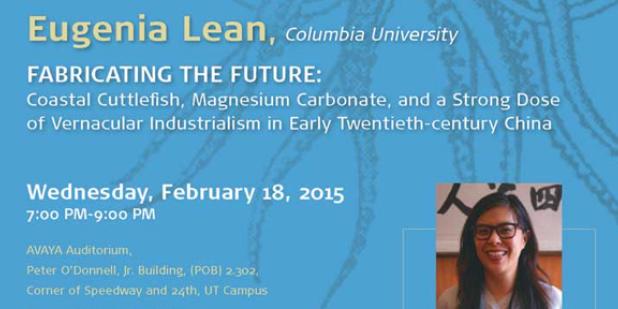Happy Lunar New Year from the USC US-China Institute!
Fabricating the Future: Coastal Cuttlefish, Magnesium Carbonate, and a Strong Dose of Vernacular Industrialism in Early Twentieth-century China
Dr. Eugenia Lean will examines the intersection among vernacular science, commerce, and the ways in which knowledge and things are authenticated in an era of mass communication.
When:
February 18, 2015 7:00pm to 9:00pm
Where

Dr. Eugenia Lean, Associate Professor of Chinese History in the Department of East Asian Languages and Cultures and Director of the Weatherhead East Asian Institute at Columbia University, will be this year's Paul and Mary Ho Distinguished lecturer in China Studies.
Dr. Lean received her BA from Stanford, and her MA and PhD from the University of California, Los Angeles. She joined the Columbia faculty in 2002. The American Historical Association awarded the 2007 John K. Fairbank prize for the best book in modern East Asian history to her book, Popular Passions: The Trial of Shi Jianqiao and the Rise of Popular Sympathy in Republican China (University of California Press 2007). In 1935, Shi Jianqiao avenged the death of her father by murdering his killer, the warlord Sun Chuanfang as knelt in prayer in a Buddhist temple. The book examines both the crime and the subsequent trial, demonstrating how public sentiment—as galvanized by Shi Jianqiao and her defense team, and fueled by popular media—played an important role in her eventual exoneration. Lean uses the events to describe passion as an important part of the formation of a critical urban public.
Her lecture, Fabricating the Future: Coastal Cuttlefish, Magnesium Carbonate, and a Strong Dose of Vernacular Industrialism in Early Twentieth-century China, draws from her current research project, Manufacturing Modernity: Chen Diexian, A Chinese Man-of-Letters in an Age of Industrial Capitalism. This project examines the intersection among vernacular science, commerce, and the ways in which knowledge and things are authenticated in an era of mass communication. The American Council of Learned Societies supported this project through a 2010-2011 Charles Ryskamp award.
Cost:
Free and Open to the Public
Event Website URL:
Featured Articles
January 4, 2024
We note the passing of many prominent individuals who played some role in U.S.-China affairs, whether in politics, economics or in helping people in one place understand the other.
Events
Thursday, March 21, 2024 - 4:00pm PST
Ying Zhu looks at new developments for Chinese and global streaming services.
Tuesday, March 19, 2024 - 4:00pm
David Zweig examines China's talent recruitment efforts, particularly towards those scientists and engineers who left China for further study. U.S. universities, labs and companies have long brought in talent from China. Are such people still welcome?






